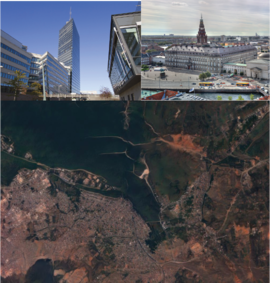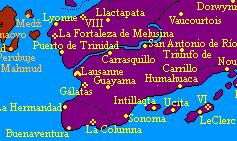Lausanne: Difference between revisions
| Line 25: | Line 25: | ||
==History== | ==History== | ||
Lausanne was originally founded by [[Stormark]] and was known as | Lausanne was originally founded by [[Stormark]] and was known as Haraldsborg. The city was named after High King [[Harald of Stormark|Harald]], who ruled over the region and made it his capital. [Haraldsborg served as the capital of the [[Stormark|Empire of Stormark]] until its [[Collapse of Stormark|collapse]]. | ||
After [[South Lyrica]] became part of [[Nouvelle Alexandrie]], the city was renamed Lausanne after the old pre-Storish [[Lyrica]]n name of the region. The root ''lausa'' means "slabs" or "flagstone", alluding to the many quarries in the region. | After [[South Lyrica]] became part of [[Nouvelle Alexandrie]], the city was renamed Lausanne after the old pre-Storish [[Lyrica]]n name of the region. The root ''lausa'' means "slabs" or "flagstone", alluding to the many quarries in the region. | ||
Revision as of 17:33, 3 February 2024
| Lausanne | |

| |
| Top: (left) the Lausanne Business District; (right) the Palace of Government of South Lyrica in central Lausanne; Bottom: Aerial map of Lausanne and the Bay of Lausanne. | |
Motto:
| |

| |
| Nation | |
| Wards | |
| Official language(s) | Istvanistani, Alexandrian |
| Demonym | Lausannois(e) |
| - Adjective | |
| Government | Mayoral |
| Mayor | Victoria Wilson-Clarke, (SDLA) |
| Establishment | 1690 AN |
| Population | 612,981 |
| Abbreviation | LAUS |
Lausanne, officially known as the City of Lausanne, is the capital and largest city of the New Alexandrian Region of South Lyrica. It is considered one of the most important cultural and economic centers of South Lyrica.
History
Lausanne was originally founded by Stormark and was known as Haraldsborg. The city was named after High King Harald, who ruled over the region and made it his capital. [Haraldsborg served as the capital of the Empire of Stormark until its collapse.
After South Lyrica became part of Nouvelle Alexandrie, the city was renamed Lausanne after the old pre-Storish Lyrican name of the region. The root lausa means "slabs" or "flagstone", alluding to the many quarries in the region.
Lausanne was designated as the capital of the new Region. The city underwent a significant period of growth and modernization, and became one of the most important centers of culture and commerce in South Lyrica. It is now a vibrant, democratic city where human rights are secured and respected.
Religion
The Temple of the Lakes, located in the heart of Lausanne, is one of the city's most prominent landmarks. Built in 1608 AN, the temple is managed by the Order of the Holy Lakes and serves as one of the most important centers of religious life in the city. The temple is known for its beautiful architecture and ornate decorations, and attracts visitors from around the world.
Politics
Lausanne is home to the headquarters and session hall of the Raspur Pact Parliamentary Assembly. The Palace of the Unity of the Raspur Pact, located in the heart of the city, is where the assembly meets to discuss and make decisions on matters affecting the Raspur Pact, a union of nations in the region.
Economy
Lausanne is a major economic center in South Lyrica, with a thriving business community and a highly developed infrastructure. The city is home to many international corporations and financial institutions, as well as numerous small and medium-sized businesses. The city's strategic location on Lake Geneva makes it an important hub for trade and commerce, connecting South Lyrica with the rest of Micras.
Culture
Lausanne is widely regarded as one of the most culturally rich cities in South Lyrica. The city has a thriving arts scene, with numerous galleries, museums, and theaters showcasing local and international talent. Lausanne is also home to several prestigious universities, including the University of Lausanne, which attracts students from around the world.